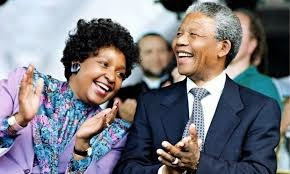Their love affair ended more than 20 years ago yet the evidence of the past few weeks is that a fundamental bond was never severed. Winnie Madikizela-Mandela could be seen almost daily visiting her former husband Nelson Mandela at the Mediclinic heart hospital in Pretoria.
Although they divorced in 1996, observers might be forgiven for inferring that they remained the loves of each other's lives to the end. Madikizela-Mandela continued to be a presence in Mandela's life in recent years despite his remarriage in 1998. Indeed, she was sometimes seen laughing and joking with her successor, Graça Machel.
 Never shy of the spotlight, she is likely to be a central figure in the days of mourning and preparation for the funeral.
At 76, Madikizela-Mandela is a giant of South African history, the subject of books, films and controversy.
She was born Nomzamo (Xhosa for "she who will go through trials") Winifred Madikizela in the rural Transkei, her childhood "a blistering inferno of racial hatred" in the words of British biographer Emma Gilbey. She moved to Johannesburg and became South Africa's first black female social worker.
Never shy of the spotlight, she is likely to be a central figure in the days of mourning and preparation for the funeral.
At 76, Madikizela-Mandela is a giant of South African history, the subject of books, films and controversy.
She was born Nomzamo (Xhosa for "she who will go through trials") Winifred Madikizela in the rural Transkei, her childhood "a blistering inferno of racial hatred" in the words of British biographer Emma Gilbey. She moved to Johannesburg and became South Africa's first black female social worker.It is easy to forget that Nelson and Winnie were once an impossibly good looking and glamorous couple, a township equivalent of Burton and Taylor or the Beckhams. She was 22 and standing at a bus stop in Soweto when he first saw her and charmed her, securing a lunch date the following week. But Mandela was married with three children and devoted to the struggle against apartheid. "The next day I got a phone call," Madikizela-Mandela has recalled. "I would be picked up after work. Nelson, a fitness fanatic, was there in the car in gym attire. I was taken to the gym, to watch him sweat! That became the pattern of my life. One moment, I was watching him.
Then he would dash off to meetings, with just time to drop me off at the hostel. Even at that stage, life with him was a life without him." After a divorce from his first wife Evelyn, Mandela married Winnie in 1958. But soon he went underground and, in 1962, was put on trial.
 He would spend 27 years in prison, separated from his wife and their two daughters by the dividing glass screen of the visitor room.
Madikizela-Mandela carved her own name in struggle lore. She was regularly detained by the apartheid government. She was tortured, subjected to house arrest, kept under surveillance, held in solitary confinement for a year and banished to a remote town.
When she returned to Soweto she became a part of the ANC campaign against the regime. "We have no guns – we have only stones, boxes of matches and petrol," she told a township crowd. "Together, hand in hand, with our boxes of matches and our necklaces we shall liberate this country.
He would spend 27 years in prison, separated from his wife and their two daughters by the dividing glass screen of the visitor room.
Madikizela-Mandela carved her own name in struggle lore. She was regularly detained by the apartheid government. She was tortured, subjected to house arrest, kept under surveillance, held in solitary confinement for a year and banished to a remote town.
When she returned to Soweto she became a part of the ANC campaign against the regime. "We have no guns – we have only stones, boxes of matches and petrol," she told a township crowd. "Together, hand in hand, with our boxes of matches and our necklaces we shall liberate this country." Necklacing meant putting a petrol-soaked burning tyre around a perceived traitor's neck. Most notoriously, she was accused of ordering the kidnapping of Stompie Seipei, 14, who was beaten and later had his throat slit. Madikizela-Mandela was acquitted of all but the kidnapping, but the incident remains the greatest stain on her legacy.
.jpg) On 11 February 1990, she was at her husband's side when he walked free from prison, making inevitable their victory over apartheid. But the marriage was dead and it was widely reported that she was having an affair with lawyer Dali Mpofu. In 1992, Mandela announced South Africa's most famous love story was over.
On 11 February 1990, she was at her husband's side when he walked free from prison, making inevitable their victory over apartheid. But the marriage was dead and it was widely reported that she was having an affair with lawyer Dali Mpofu. In 1992, Mandela announced South Africa's most famous love story was over.Still an ANC MP and living in Soweto, Madikizela-Mandela has since continued to divide opinions but has never been banished from the former president's home. She once recalled: "I had so little time to love him. And that love has survived all these years of separation … perhaps if I'd had time to know him better I might have found a lot of faults, but I only had time to love him and long for him all the time."

No comments:
Post a Comment